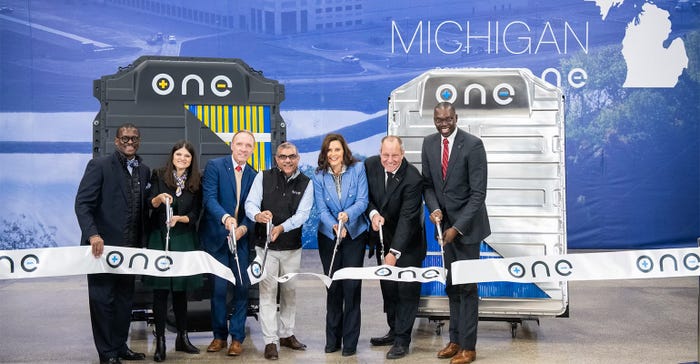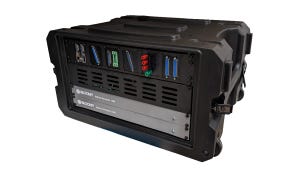Government and industry are all in on the move to electric vehicles; voters much less so. The state of Michigan is a prime example.
April 17, 2023

Earlier this year, Battery Technology reported a then-tally of $128B in announced construction plans for electric vehicle (EV) manufacturing, battery plants, and battery recycling facilities, representing thousands of potential jobs in regions throughout the country. That figure has only gone up. (“Battery Manufacturing Keeps Growing in the US,” Battery Technology, April 7, 2023).
Concurrent with that rise are reports that a notable percentage of Americans are registering their opposition to EVs in general and attempting to block specific battery plant projects entirely.
The Michigan example
Michigan, with its vaunted vehicle engineering and manufacturing infrastructure, has been a noteworthy example of strong government support together with OEM commitment in the billions of dollars for plant construction and workforce development. Recent major announced EV and battery plants include General Motors’ Factory ZERO in Detroit, Ford’s battery plant in the town of Marshall, and China’s Gotion’s megasite $2.4B plant for making anode and cathode materials planned for West Michigan’s Green Charter Township.

Yet a notable percentage of the Michigan public is skeptical if not strongly opposed to vehicle electrification. In late March, the Detroit Regional Chamber released the results of a survey it conducted of 600 registered Michigan voters in February. On the question of if they support or oppose automakers shifting from gas-powered to EVs, 46.4% support the shift while 44.4% oppose the shift. A third of the Michigan voters surveyed (33.4%) said they strongly oppose the shift to EVs.
These figures were largely mirrored nationally in a Gallup poll on support for EVs released on April 12. About 43% of US adults say they might consider buying an EV in the future, while 41% unequivocally say they would not.
In the Michigan poll, regionalism made a difference, as did political affiliation. Metro Detroit voters support EVs by a margin of 53.3 – 32.4%. Outstate voters oppose the shift by a margin of 40.2 – 50.6%. Voters identifying as leaning Democratic were 64.7% in favor of EVs while those identifying as strongly Democratic were 72.6 % in support. Voters leaning Republican were 73.3% opposed and those strongly Republican were 69.6% opposed.
The perceived cost was a driver in opposition, with 18.4% of the Michigan nay-sayers saying EVs were too expensive and 19.6% checking “Our electric grid cannot handle it.”
Further inspection of survey results confirms EV adoption is still in its infancy. Only 4% of the respondents said they already own an EV, but a third (33.9%) said they would consider an EV for their next purchase.
Generating heat, not necessarily light
This still left a majority of the Michigan survey respondents (60.1%) saying they would not consider an EV for their next purchase—and lately, the rhetoric has been heating up.
On April 6, several hundred people dialed into a video presentation and panel discussion that Gotion representatives along with Green Charter Township leadership and other groups supporting the project put on to answer opposition questions in a public forum. It was decided to move from an in-person meeting to an online forum for safety concerns. Jim Chapman, Green Charter Township supervisor, noted that plans, proposals, and resolutions of support have been posted on the Green Charter Township website for months, and initial township support ranged from 90 – 95%.
“The percentage has dropped due to extensive efforts to spread false information,” Chapman said, adding “While groups such as this meeting may think it shows 100% opposition, it shows a group of like-minded people, not the majority of residents... Death threats are typical tactics of such groups. Making a huge commotion at someone’s house in order to intimidate them instead of in a public place to affect public opinion is typical of such groups. Threatening to call in an armed militia, in this case, the Michigan Militia, is a tactic of such groups.”
Other opposition figures raised fear of Chinese Communist Party (CCP) activity by a Chinese-owned company. Failed Michigan gubernatorial candidate and conservative podcaster Tudor Dixon tweeted “Michigan is handing $715M taxpayer dollars to Gotion, a company with clearly documented ties to the Chinese Communist Party. Why are we allowing the enemy to own land and set up shop in the center of the country?”
Randy Thelen, CEO of Michigan business promotion firm The Right Place and a panelist on the April 6 presentation, answered by saying Gotion would join 52 other Chinese-owned companies in Michigan. The largest, he said, is Nexteer Automotive, based in Saginaw, and among international business ownership in Michigan, China follows Germany, Japan, and France.
Additionally, Bridge Michigan, an independent online news source, reported Gotion is voluntarily submitting to, and paying for, a financial review through the Committee on Foreign Investment in the United States (CFIUS), an interagency committee led by the U.S. Department of Treasury that reviews foreign investments.
Let common sense prevail
While groups and individuals at the grassroots level perhaps may be fated to permanently disagree on such global perspectives as climate change, decarbonization, and battery-powered life in general, market forces will have their say. Between 2020 and 2022, EV sales grew more than 90% in both the United States and Europe and more than 300% in China, reports McKinsey & Company.
Also permanent is the need for patient explanation and education. Says Sandy K. Baruah, Detroit Regional Chamber president and CEO, “These continued and growing perception disconnects raise the bar for public policymakers, business leaders, and organizations focused on economic prosperity such as the Chamber to better educate the public to prepare for the changing dynamics of the 21st Century global economy.”
As those national Gallup poll results demonstrate, the need for education is not only in one Midwestern state but rather nationwide.
Editor’s note: This brings a close to Battery Technology’s “Brave New Battery World” series and its attempt to describe how batteries and electrification are changing our world. Coverage has included marshaling government support and creating an industry roadmap (Part 1); new research efforts (Part 2); the global battery production boom (Part 3): materials supply-chain issues (Part 4); why recycling is essential to the battery business (Part 5); how to work workforce development (Part 6); and a developing techno-economics model to assist in battery design and production costing (Part 7). As the Brave New Battery World and its people, developments, tech, and business impact continue, be assured so will our coverage.
About the Author(s)
You May Also Like





